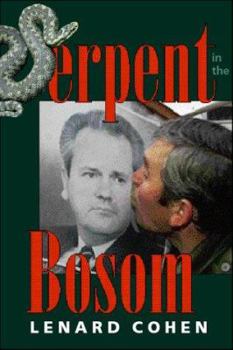Serpent in the Bosom: The Rise and Fall of the Slobodan Milosevic
Select Format
Select Condition 
Book Overview
The violent disintegration of the former Yugoslavia, and its aftermath, highlight the importance of a detailed understanding of the Balkan region. The political outlook and behavior of the Serbs and Serbian elites has been particularly bewildering to Western citizens and decision-makers. Serpent in the Bosom provides an analysis of Serbian politics from 1987 to 2000 that centers on an examination of Slobodan Milosevic's rise to power, his pattern...
Format:Hardcover
Language:English
ISBN:0813329027
ISBN13:9780813329024
Release Date:December 2000
Publisher:Westview Press
Length:438 Pages
Weight:1.75 lbs.
Dimensions:1.3" x 6.4" x 9.3"
Customer Reviews
2 ratings
Slobo not party animal
Published by Thriftbooks.com User , 19 years ago
This is the best of the Milosevic books in terms of biographical information for those interested in what kind of man he really is. Granted, there isn't a lot of detail about him, but it's most than others. Something is always missing when people describe him--he was a charming but complete cynical bastardo. One has to be impressed with the trained abiltity to just lie to people outright and make them believe it. A man with no vision but a knack for quick power plays, the wily Slobo finally committed about fifty too many war crimes and just had to go. He now resides in The Hague, where his high blood pressure will be the ultimate judge before the hasty four-year trial wraps up. Slobo sounds like a rather banal, cold dude. His rule was hardly prosperous. Multiple wars, sanctions, NATO bombs, refugees, massive atrocities--again, Slobo's skill is his ability to paint himself as a not-so-perfect leader who is no worse than anyone else. The country was run into the ground and finally they just couldn't take the atrocities and burned the Parliament building. A very thorough account of the Milosevic years, though obviously Milosevic-centric. More than a biography of the leader, a pretty good history book as well. Revised edition is inevitable. If he survives sentencing, we can possibly expect the autobiography, in which Slobo writes his own history book.
Excellent one volume treatment of Milosevic's rule
Published by Thriftbooks.com User , 23 years ago
This book is the best English-language treatment to date of Milosevic's rule in Serbia as can be found in a single volume.It is not just a biography, though that, too, can be found in the sections discussing Milosevic's rise to power (frequently drawing on the pathbreaking work of Serb journalist Slavoljub Djukic). Cohen's work is much more a well-researched account of the main political events, players, and contexts in Serbia/Yugoslavia where Milosevic is the central, but far from exclusive, focus.Cohen treats primarily domestic politics, but also spends a fair amount of time on the foreign context, particularly in relation to Dayton and also the Kosovo conflict. He is particularly good on summarizing the levers of power and patrimonial methods used by Milosevic, and especially Serbian political culture--something of a favorite topic with Cohen--that helped to underpin Milosevic's rule. Cohen's cultural emphasis leads him to argue that some authoritarian social attitudes are likely to trouble, though not necessarily determine, Serbian politics after Milosevic's departure.As much as I like the political-party level details available in Robert Thomas's _Politics of Serbia in the 1990s_ (especially on party origins), and the interesting political-cultural account in Eric Gordy's _The Culture of Power in Serbia_, Cohen does a better, more thorough job fleshing out the factional character of the Milosevic regime and its opposition, with more attention paid to basic features of political economy and analysis of social support for political players. It might be possible to improve on this book by touching up details and tightening particular arguments, but for an avowed case study speaking to larger questions, Cohen has raised the empirical and analytical bar impressively high.Cohen's treatment of the Kosovo conflict is quite good in its details, but journalist Tim Judah's book on Kosovo is better on the genealogy and players of Albanian military and political groups and the negotiations at Rambouillet and during the war. For laypeople, Cohen also gives an excellent thumbnail sketch of debates over the character of nationalism, and concrete policy outcomes in the Balkans as a result of the debate. He does not, however, really clarify to what extent nationalism on any side should be tolerated and respected, preferring instead to warn the West in general terms to be "open-minded" and "pragmatic" of the complexities behind myths and national aspirations. It's a plea for comprehension first, but short on policy specifics, which, in retrospect, is perhaps not such a bad thing.The only other flaw I have to mention is the repeated and distracting spelling errors [e.g., "loosing" for losing] and somewhat less frequent syntactical / grammatical mistakes peppered throughout. Considering how hard it is for all of us to edit our own copy after months of staring at monitors, the fault lies with copy editors who are paid not to rely solely on their spell-ch






